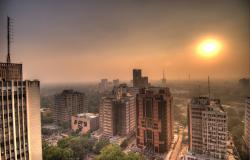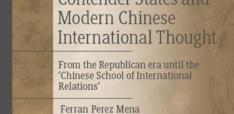Reorder Follows Disruption – The rewriting of global rules, as seen from India

GP Columnist Cornelius Adebahr on India's embrace of the loosening of Western dominance.
With political commentators in Europe busy stressing the critical importance of 2019 for their continent and their US counterparts plagued by the absence of a functioning government, the Raisina Dialogue assembled policy makers and thinkers from around the world in New Delhi to look even farther ahead: to imagine a global reordering over the coming decade.
Unsurprisingly, the role of India as a (future) global power in particular and the – widely-defined and somewhat newly-termed – region of the “Indo-Pacific” more broadly featured prominently in the debates. Participating upon generous invitation by the organizing Observer Research Foundation, the author noticed some striking assertions as well as some irritating obsessions when it comes to how India sees the world. That is, of course, only insofar as it is fair to digest, necessarily subjectively, an ‘Indian view’ from the plethora of voices – young and old, male and female, of officials and experts – heard at that gathering.
First, the assertions. For the Indian foreign policy establishment, it seems that the disruptions of the world have already taken place and the global reordering has begun. The Western world is still struggling to make sense of its loss of influence in the international system, and of the rise of inequalities within their societies exacerbated by the financial crisis of 2008. At this point, a careful differentiation was sometimes made between the United Kingdom and the United States on the one hand, where populism and isolationism have already left a profound mark, and the European continent as well as the EU on the other, which are striving to maintain the current, oft-termed “liberal” world order.
India, in contrast, fully embraces the opportunities brought about by the loosening of western dominance. Seeing a reversal of broad historical trends, it joins the claim that the 21st century will be Asian, after the previous one was European in its first half and American in the second (and the 19th century before was Imperial Britain’s, a fact that does not get lost on the visitor to Delhi). India carefully welcomes even the rise of its arch-rival China, in that this manifests a visible shift of the global power distribution towards the East. Consequently, and importantly, India would be strategically located at the center of this new “supercontinent” (a political term with no relation to current Earth’s predecessor Pangea from Permian times).
As for the obsessions on display, it was easy to note that Pakistan hardly got a mention – despite the fact that the Indian-Pakistani rivalry still represents one of the hottest nuclear confrontations on the planet. This is presumably because Delhi sees the dispute over Kashmir as a bilateral affair that should not be subject of any international forum. China, in turn, was referenced a lot, though mostly without a Chinese representative or scholar on the podium. Beijing, it appears, is the metaphorical elephant – or, rather, dragon – in the room in any Indian debate on global order: It lurks in discussions about artificial intelligence, its blue water navy sailing the Indian Ocean, and the ‘Chinese model’ of authoritarian capitalism as a possible alternative to liberal democracy.
Absent from the discussion was any consideration of whether rising CO2 levels will fundamentally change the planets ecosystem – with the latest UN report indicating that anthropogenic emissions have already altered the earth’s climate for centuries, if not millennia. Or of how finite resources can be wisely used to deal with a continuously increasing population – projected to surge from around 6 billion in 2000 to over 11 billion by 2100, thus nearly doubling in size over the course of the century. Or of how Asia – a continent full of rivalling nation states rather than a coherent community – would shape the century it is said to dominate? Which ‘Asian model’ of development would actually minimize the existing sharp socio-economic inequalities rather than exacerbate them by simply copying the old Western model?
These fundamental questions notwithstanding, India aims to become “a rule maker in the 21st century”, as Foreign Secretary Vijay Gokhle said. If Europe does not want to lose its current seat at the table of global rule-making, it has to lift its sights, literally and figuratively: It has to (re-)discover the other, bigger end of the Eurasian landmass behind the Ural Mountains. Rather than merely being the receiving end of China’s ‘Belt and Road’ strategy, it has to itself invest in the trading routes both on land and at sea that connect the East and West as they did over centuries. (The same is true for Europe’s look beyond the immediate Southern shores of the Mediterranean to see the whole of Africa not simply as a source of migration to fend off but as a continent of growing possibilities. Delhi not only sees East Africa as part of the Indo-Pacific region, but has recently also invested in a partnership with West Africa, even though the distance from Delhi to Abuja is two-thirds longer than from the Nigerian capital to Brussels.) The ‘long overdue’ EU Connectivity Strategy vis-à-vis Eurasia therefore needs to be quickly and thoroughly implemented.
In the figurative sense, Europe has to lift its sights beyond its own sense of crisis and seize the opportunities that a more multilateral world offers. True, things were easier when the bipolar confrontation was gone, no new rivals were on the horizon, and the transatlantic partners were mostly in agreement. However, this was an historically brief moment that by all estimations could not have lasted long. So precisely because Washington has questioned the consensus underlying the existing world order, Europeans would be well advised to find – all while maintaining the transatlantic bonds as much as they can – new allies that would support a rules-based order rather than a “might is right” free for all.
No doubt, rules will have to be rewritten, in order to accommodate old-new powers in the 21st century and to thus build a more equitable world order. The EU will want to make sure that this is an orderly process, and it should enlist India as the world’s greatest democracy and one of its soon-to-be economic giants as a partner in this endeavor.
Image Credit: Ville Miettinen via Flickr(CC BY 2.0)


